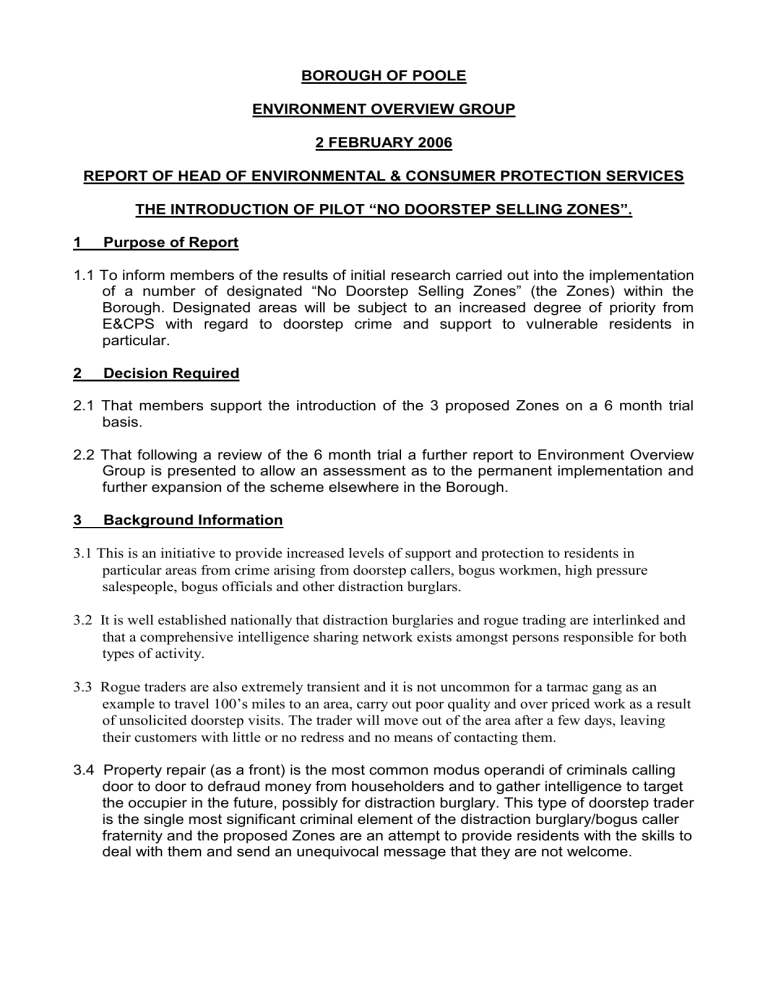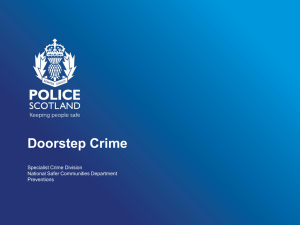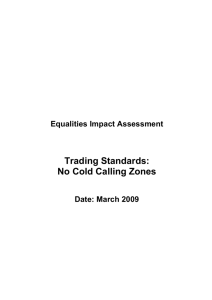the introduction of pilot “no doorstep selling zones”.

BOROUGH OF POOLE
ENVIRONMENT OVERVIEW GROUP
2 FEBRUARY 2006
REPORT OF HEAD OF ENVIRONMENTAL & CONSUMER PROTECTION SERVICES
THE INTRODUCTION OF PILOT “NO DOORSTEP SELLING ZONES”.
1 Purpose of Report
1.1 To inform members of the results of initial research carried out into the implementation of a number of designated “No Doorstep Selling Zones” (the Zones) within the
Borough. Designated areas will be subject to an increased degree of priority from
E&CPS with regard to doorstep crime and support to vulnerable residents in particular.
2 Decision Required
2.1 That members support the introduction of the 3 proposed Zones on a 6 month trial basis.
2.2 That following a review of the 6 month trial a further report to Environment Overview
Group is presented to allow an assessment as to the permanent implementation and further expansion of the scheme elsewhere in the Borough.
3 Background Information
3.1 This is an initiative to provide increased levels of support and protection to residents in particular areas from crime arising from doorstep callers, bogus workmen, high pressure salespeople, bogus officials and other distraction burglars.
3.2 It is well established nationally that distraction burglaries and rogue trading are interlinked and that a comprehensive intelligence sharing network exists amongst persons responsible for both types of activity.
3.3 Rogue traders are also extremely transient and it is not uncommon for a tarmac gang as an example to travel 100’s miles to an area, carry out poor quality and over priced work as a result of unsolicited doorstep visits. The trader will move out of the area after a few days, leaving their customers with little or no redress and no means of contacting them.
3.4 Property repair (as a front) is the most common modus operandi of criminals calling door to door to defraud money from householders and to gather intelligence to target the occupier in the future, possibly for distraction burglary. This type of doorstep trader is the single most significant criminal element of the distraction burglary/bogus caller fraternity and the proposed Zones are an attempt to provide residents with the skills to deal with them and send an unequivocal message that they are not welcome.
3.5 Whilst doorstep crime can impact on anybody research shows that older people are particularly vulnerable, especially those without the support systems provided by neighbours, family, etc.
The profile of a typical victim of doorstep crime is an 82 year old, woman living on her own.
3.6 Incidents involving older people losing thousands of pounds as a result of doorstep crime within Poole and the surrounding area are now not unusual. In the absence of current effective legislative controls over rogue traders the proposed Zones can play an important role in raising the profile of this type of crime in Poole, provide a early warning system to enforcement agencies and equip residents with the skills and confidence to deal with unwanted doorstep traders.
4 No Doorstep Selling Zones
4.1 In June 2005, following successful trials in Cambridgeshire, a national campaign to role out community based schemes was launched to encourage residents to put up signs and use door stickers advising unsolicited doorstep traders that they were not welcome and that they would be reported to the authorities if they cold called in a clearly defined area.
4.2 Fundamental to the success of the Zones is marking the areas boundaries with signs which clearly say that it is a “No Doorstep Selling” area. These signs are likely to be fixed to a lamp-post, wall, etc or used in conjunction with existing Neighbourhood
Watch signs.
4.3 Residents within the Zones would be encouraged to report doorstep sellers directly to
E&CPS or the Police who will respond to ensure the trader is complying with any relevant trading standards legislation and advise the trader they are unwelcome in the
Zone. In all cases where a doorstep trader is identified in the Zone it will be followed up and the trader requested not to cold call in the area again. Members are requested to note that the Zone’s would have no statutory status and it would not be illegal for traders to continue to cold call within the area.
4.4 The situation within Poole is that there are no particular ‘hotspots’ of doorstep crime and levels are consistent throughout the authority with sporadic reports received from all wards. There were 41 recorded complaints against doorstep sellers for the
Borough of Poole during 2005. However these issues are hugely unreported nationally, and assuming that the reporting rate discovered in our study of the prospective Zone’s i.e. 6.3% remains constant across the authority, this would equate to an actual rate of doorstep sales dissatisfaction of 651 instances per annum.
Identification of local pilot areas:
4.5 In view of the absence of an outstanding area officers, using articles about the scheme in Poole News and the Daily Echo, requested residents who would be interested in trialing a Zone on behalf of the authority to volunteer. A total of 20 residents initially nominated their street or road and were supplied with details of how the Zone would work and what was involved. They were asked to provide some benchmark information on the current levels of cold calling, previous experience with doorstep sellers, etc.
4.6 As a result 13 areas, spread throughout the authority, were subject to further analysis as to whether they would be suitable to be a trial Zone. This was based on the initial information supplied by the nominating resident, doorstep trading complaint records held by E&CPS, analysis of Police reports, the demographic profile of the residents and a geographical assessment (since not every area lends itself to being clearly demarked).
4.7 This exercise indicated that 3 nominated areas in particular seemed suitable for further examination; those around Gorse Hill Rd, St Clements Rd and Conifer Ave.
4.8 In December 2005 a total of 416 households in the following roads were provided with a fact sheet outlining what the proposed Zones where, how they would work and residents were asked to respond to a questionnaire on their experiences with doorstep sellers and whether they would be happy for their area to trial the scheme:
Gorse Hill Road
Gorse Hill Crescent
Gorse Hill Close
Conifer Avenue
South Western Crescent
St Clements Road
Walton Road
Kinson Avenue
White Close
4.9 A summary of the 177 responses received is attached as a background paper
(Annex A).
In brief, this indicates that; 25% of respondents had been cold called 5 times or more within the preceding year, 31% had been targeted by itinerant gardeners, 25% by tarmac gangs and 75% by energy sales staff. Of those who had been cold called 18% considered they’d had a poor experience or problem with the services supplied but only 6.3% had reported the incident to the enforcement authorities which underlines the issues of under-reporting. Only 4% felt there was any benefit whatsoever in traders calling unsolicited. In view of these results it is suggested to members that each of the 3 nominated areas are progressed on a trial basis.
4.10 In 2003 the Institute of Trading Standards carried out the largest survey so far conducted into attitudes towards doorstep trading. The results from the authorities own consultation are identical to the conclusions of the larger exercise; in that 95% of householders did not want to be cold called and there is a significant issue of under reporting of problems with doorstep sellers.
4.11 Discussions with Dorset Police and Neighbourhood Watch so far indicate a very positive response to the initiative and E&CPS would look to share any information obtained about the activities of rogue traders with other enforcement agencies. Local media sources have shown a ongoing interest in doorstep crime and a high profile launch and regular updates are an essential element of the strategic reasoning behind the Zone’s.
4.12 It is suggested that an appropriate time for the implementation of the Zones would be in the spring to coincide with the higher levels of doorstep selling that traditionally take place in the summer months.
4.13 As these would be the first Zones in the South West region other authorities are following Poole’s approach with an interest to adopting their use elsewhere and this is an opportunity to have a positive influence on tackling doorstep crime regionally.
4.14 Experience elsewhere in the UK also indicates that the implementation of similar zones has had a knock on effect on other reported crime e.g. reducing dwelling burglary.
5 Consideration
5.1 In the foreseeable absence of effective statutory measures prohibiting the cold calling of goods or services on the doorstep this approach represents an innovative way of promoting good doorstep practice throughout Poole and auditing those traders that visit on an occasional basis.
5.2 There are limited capital costs involved in the setting up of the Zones, mostly around printing and the purchase of street signs. E&CPS are currently exploring potential matched funding for this through a sponsored grant.
5.3 96% of residents who responded supported the proposals. A few concerns were raised regarding the effectiveness of a non statutory based scheme, the appearance/quantity of street signs and whether the authority should be attempting to stop all traders from potential sales in an area. The conclusion from the survey carried out in the prospective Zones overwhelmingly indicates however that the householders in these areas do not welcome uninvited sales staff who are seen at best as a nuisance and can in the worst examples commit crimes that have a significant and lasting effect on the victim.
Head of Environmental and Consumer Protection Services
Contact Officer: Jeff Morley, Team Manager
01202 261700
Background Papers: Annex A - Summary of questionnaires returned.
Annex A - Summary of Residents Responses.
Area
Gorse Hill
Conifer Ave
St Clements
Responses
Received
5>
Doorstep
Sellers
2005
Types of caller History of Reported Can Agree to complaints/ the See a trial Zone
2 to 4 1 only 0 or don't Double Roofing Tarmac Gardening Security Property Energy Other poor service Incident Benefit know Glazing Repairs
33
83
61
11
23
11
18
41
35
2
12
5
2
7
9
20
38
24
3
7
4
7
11
27
12
28
16
4
8
4
11
7
9
26
70
37
4
21
25
10
14
8
2
0
0
1
3
3
33
78
58
Total 177 45 94
As a percentage =
(Response rate = 42.5%)
25.4 53.1
19
10.7
18
10.2
82
46.3
14
7.9
45
25.4
56
31.6
16
9.0
27
15.3
133
75.1
50
28.2
32
18.1
2
6.3
7
4.0
169
95.5





